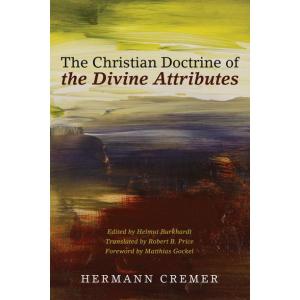The Eternity and Immutability of God according to Hermann Cremer in The Christian Doctrine of the Divine Attributes, 4:4, pp. 76-81
Kudos to those who are continuing reading this book with me! For those who have not read these pages, please do not comment. You may, however, ask a question. In about a week I will comment here on 5: The Unity of the Divine Attributes, or the Glory of God, pp. 82-84 and wrap up discussion of this book.
According to Cremer, this important but little known German theologian who so influenced Barth (sometimes I think I’m reading Barth!), God’s eternity means “the exercise of [God’s] transcendence over the law of becoming and passing away upon us and our life.” (77) God does not “become.” “God…transcends the nature of time and the succession of moments…[in] an eternity of simultaneity.” (78)
I like clear and distinct ideas. The only clear and distinct idea I can grasp of “eternity” is “everlastingness” (Wolterstorff). And I cannot conceive how God, experiencing simultaneity with all times, can “act differently.” (80) To act differently is to act in time.
But, on to God’s immutability. According to Cremer, God’s immutability is “the constancy of [his] love in the wealth of its manifestations.” (80) With that I can whole heartedly agree. Cremer goes on to say about God’s appearance to us to accomplish redemption: “Of this appearance, the content is the same, the subject is the same, and the attributes are the same. Only the manner of its appearing differs, as it takes particular form for its task, so that it would have been otherwise had there been no sin.” (80) Cremer also affirms “a diversity of the working of [God’s] love.” (80)
So, according to Cremer, God’s appearing and working takes different forms, but God’s essence and attributes never change. Again, I can agree with that. But I worry that here Cremer has driven something of a wedge between God in himself and God for us—something he goes on to reject. According to him, God determined himself before the world and its time “to be for the world.” (78) (That is a belief Barth strongly affirmed.)
Not very long before Cremer wrote this book, I. A. Dorner, a very important and influential German theologian, wrote a very long essay, almost book-length, about God’s “ethical immutability.” I find Dorner’s discussion very helpful. In his view, and mine, God changes in his ways and even being affected by the world and its history, but does not change in his essence. I only wish that Cremer had interacted with Dorner’s view. I see echoes but not identity.
*Note: If you choose to comment, make sure you have read this passage. If not, feel free to question. In either case, keep it relatively brief (no more than 100 words), on topic, addressed to me, civil and respectful (not hostile or argumentative), and devoid of pictures or links.*

















